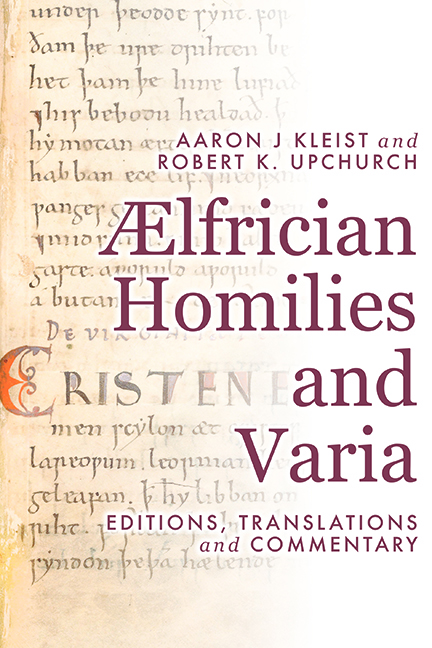Book contents
- Frontmatter
- Contents
- Preface
- Acknowledgements
- Abbreviations
- Sigla for Cited Ælfrician Manuscripts
- Dates for Cited Ælfrician Works
- Editorial Conventions
- Conventions Used in the Commentaries
- Homilies The Proper of the Season
- Homilies The Proper of the Saints
- Ælfrician Homilies and Varia: Editions, Translations, and Commentary: Volume II
- Homilies The Common of the Saints
- Homilies Unspecified Occasions
- Varia
- Works Cited
- Index
- ANGLO-SAXON TEXTS
3 - Friday after the Fourth Sunday in Lent: Erat quidam languens Lazarus (‘There was a certain sick man, Lazarus’ [John 11.1–45])
Published online by Cambridge University Press: 05 March 2024
- Frontmatter
- Contents
- Preface
- Acknowledgements
- Abbreviations
- Sigla for Cited Ælfrician Manuscripts
- Dates for Cited Ælfrician Works
- Editorial Conventions
- Conventions Used in the Commentaries
- Homilies The Proper of the Season
- Homilies The Proper of the Saints
- Ælfrician Homilies and Varia: Editions, Translations, and Commentary: Volume II
- Homilies The Common of the Saints
- Homilies Unspecified Occasions
- Varia
- Works Cited
- Index
- ANGLO-SAXON TEXTS
Summary
Like the first two sermons, Erat quidam languens Lazarus (‘There was a certain sick man, Lazarus’) is a homily for the Proper of the Season, specifically the Friday of the fourth week of Lent. Our editorial title is taken from the incipit of John 11.1 because the gripping story of Jesus’ raising of Lazarus recounted in John 11.1–45 was the pericope, the portion of Gospel appointed to be read at Mass, for that Friday. It was a story that held Ælfric's attention over a decade and would lead him to compose two, possibly three, versions of the sermon, each of which we print here in full as Lazarus I, II, and III.
Ælfric composed Lazarus I between 993 and 9982 after issuing the Catholic Homilies and before he issued the Lives of Saints. It apparently formed part of his initial efforts to provide pericope homilies for occasions not commemorated in the Catholic Homilies. He began with a sermon for the Third Sunday in Lent (his fifth for those five Sundays) and five sermons for the consecutive Fridays in Lent before Good Friday. In addition to the alliterative style characteristic of Ælfric's later works, the six homilies are united by ecclesiastical season and the series of five Friday homilies by a particular day. He does not, however, develop for the series an overarching theme, but the Friday homilies broadly cohere because they anticipate Christ's Passion.
Ælfric begins Lazarus I with a close translation of John 11.1–45 [lines 1–112]. Guided by Augustine's exposition of this same passage in his Tractates on the Gospel of John, he then turns to consider more broadly the general resurrection on the Last Day [lines 113–61] and the soul's spiritual death from sin [lines 162–210]. In the section on the soul's death, he rewrites material he used earlier in the Catholic Homilies when discussing Christ's resurrection of the son of the widow of Nain (Luke 7.11–16) in his sermon for the Seventeenth Sunday after Pentecost (CH I.33). Ælfric had originally relied on Bede, but in Lazarus I, he follows Augustine to interpret in spiritual terms the deaths of the three people Jesus raised and to illustrate the hope of forgiveness through repentance with the story of the sinful woman's anointing of Jesus’ feet [lines 211–36].
- Type
- Chapter
- Information
- Ælfrician Homilies and VariaEditions, Translations, and Commentary, pp. 209 - 292Publisher: Boydell & BrewerPrint publication year: 2022

